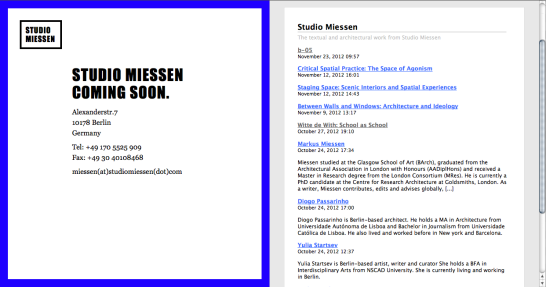Ten minutes ago, I read about the #back2blog challenge being launched today by @stephtara. So here’s a quick and dirty post, summarizing some thoughts about one of the webs most underrated standards: Rich Site Summary, aka Really Simple Syndication, aka RSS.
Years ago, I wrote my first RSS feed, manually in a text editor, in order to get a bunch of videos submitted into some unnamed web aggregator. I didn’t really understand the purpose of it. Even less the rationale for different competing standards – RSS2, atom, iTunes extended media feed markup…
Later, when hacking my first WordPress themes, those feeds showed up again on my radar – RSS, that garbage in the page header that’s almost impossible to disable (and why the heck would I want comment feeds, if the site has all comments disabled to begin with)?
One of the greatest things about RSS, apart from being the superglue that can force different assymetric parts of the web to stick together and cooperate, is it’s icon. It’s brilliant, expressing the publishing power of the web, far better than all the Facebooks, Twitters, Flickrs, Vimeos and Youtubes together. I wonder who’s the genius who designed it? Even Wikipedia doesn’t know…
Then some years ago, for no obvious reason, the dominant browsers began to remove that wonderful icon from their navigation bar. RSS was pushed into the underground, it became a secret cult, a hidden superpower for standardistas and übergeeks.
(insert anecdote by codepo8)
Then, earlier this year, reading the eulogies for Aaron Swartz, I discovered he had co-authored the RSS 1.0 spec at age 14. For some reason, this discovery made a lot of sense in the Grand Scheme of Things, and served to me as a reminder that we should never, ever, abandon RSS.
Let’s have a look at the pityfull state of RSS readers. I am currently using Vienna, a simple open source RSS reader for OSX without bells and whistles, but it does exactly what I expect it to do. Major feature: it doesn’t require me to use Google Reader… (Why would I want my feeds to be centralized by Google? Why should I add a single point of failure to a working decentralized system? Why would I want Google to know even more about my reading habits than it already does?)
An interesting side effect of tracking your personal thought leaders through RSS (rather than sheepishly following their social statuses) is that it’s both a quantitative filter, and an occasional backdoor into their walled gardens.
A good example is the website of architect Markus Miessen: since months, the front door shows a “Coming Soon” sign with no public entrance, but if you subscribe to the feed, you will receive weekly updates about the latest additions to the upcoming site. How nice!
This post is the first entry of #back2blog series. Stay tuned! :)
